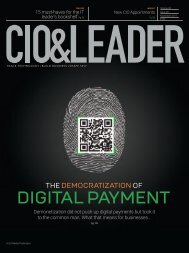white_paper_on_data_protection_in_india_171127_final_v2
Create successful ePaper yourself
Turn your PDF publications into a flip-book with our unique Google optimized e-Paper software.
such a right may be unsuitable <strong>in</strong> the Indian c<strong>on</strong>text unless similar grounds for process<strong>in</strong>g are<br />
deemed suitable for India (see Part III, Chapter 4 of this White Paper).<br />
(iv) Overlap with sector-specific regulati<strong>on</strong>s<br />
Data protecti<strong>on</strong> laws of several jurisdicti<strong>on</strong>s have special provisi<strong>on</strong>s for ‗direct market<strong>in</strong>g‘<br />
which at times, supplement special laws for deal<strong>in</strong>g with spam or telemarketers. For <strong>in</strong>stance,<br />
<strong>in</strong> the EU, the Privacy and Electr<strong>on</strong>ic Communicati<strong>on</strong> Directive 2002 deals with questi<strong>on</strong>s of<br />
unsolicited communicati<strong>on</strong>. Similarly, <strong>in</strong> Australia <strong>in</strong> additi<strong>on</strong> to provisi<strong>on</strong>s <strong>on</strong> direct<br />
market<strong>in</strong>g <strong>in</strong> the Privacy Act, 615 there exists sector specific laws such as the Spam Act, 2003<br />
and the Do Not Call Register Act, 2006. In Canada <strong>on</strong> the other hand, there is no specific<br />
provisi<strong>on</strong> <strong>on</strong> direct market<strong>in</strong>g <strong>in</strong> the PIPEDA and it can be presumed that direct market<strong>in</strong>g<br />
takes place <strong>on</strong> the ground of c<strong>on</strong>sent and c<strong>on</strong>sequently an <strong>in</strong>dividual can withdraw c<strong>on</strong>sent.<br />
Canada however has an Anti-Spam Legislati<strong>on</strong> 2014 that prohibits bus<strong>in</strong>esses from send<strong>in</strong>g<br />
―commercial electr<strong>on</strong>ic messages‖ to an <strong>in</strong>dividual without her c<strong>on</strong>sent. 616 In India, the TRAI<br />
Regulati<strong>on</strong>s deals with unsolicited commercial communicati<strong>on</strong>s. However, it is limited to<br />
messages and other communicati<strong>on</strong> through ph<strong>on</strong>es, and would not cover an email<br />
applicati<strong>on</strong> or advertisements appear<strong>in</strong>g <strong>on</strong> browsers. In light of this, a call needs to be taken<br />
about whether direct market<strong>in</strong>g should be treated as a discrete privacy pr<strong>in</strong>ciple <strong>in</strong> India or<br />
addressed via sector specific regulati<strong>on</strong>s.<br />
(v)<br />
Automated Decisi<strong>on</strong> Mak<strong>in</strong>g<br />
Provisi<strong>on</strong>s regard<strong>in</strong>g automated decisi<strong>on</strong> mak<strong>in</strong>g are miss<strong>in</strong>g vital safeguards. For <strong>in</strong>stance,<br />
an <strong>in</strong>dividual can <strong>on</strong>ly object to automated decisi<strong>on</strong>s which are processed solely by automated<br />
means and which have ―legal or other significant effects‖. Such requirements significantly<br />
limit the scope of the right s<strong>in</strong>ce any human <strong>in</strong>volvement <strong>in</strong> a decisi<strong>on</strong>-mak<strong>in</strong>g process could<br />
mean it is not ‗automated decisi<strong>on</strong>-mak<strong>in</strong>g‘. 617 Similarly, issues could arise vis-a-vis the<br />
terms like ―legal or significant effects‖ s<strong>in</strong>ce their scope c<strong>on</strong>t<strong>in</strong>ues to be unsettled. 618 That<br />
said, it should be kept <strong>in</strong> m<strong>in</strong>d that such provisi<strong>on</strong>s must keep pace with technological<br />
developments.<br />
9.3 Internati<strong>on</strong>al Practices<br />
The above discussed rights are particularly unique to the EU. Thus, they are reflected <strong>on</strong>ly <strong>in</strong><br />
EU jurisdicti<strong>on</strong>s or jurisdicti<strong>on</strong>s broadly follow<strong>in</strong>g the EU model such as South Africa.<br />
Further, the right to restrict process<strong>in</strong>g, the right to <strong>data</strong> portability and the right to be<br />
615 Pr<strong>in</strong>ciple 7, Schedule 1, Privacy Act.<br />
616 Secti<strong>on</strong> 6, The Electr<strong>on</strong>ic Commerce Protecti<strong>on</strong> Act.<br />
617 Sandra Wachter et al., ‗Why a Right to Explanati<strong>on</strong> of Automated Decisi<strong>on</strong>-Mak<strong>in</strong>g Does Not Exist <strong>in</strong> the<br />
General Data Protecti<strong>on</strong> Regulati<strong>on</strong>‘, 7(2) Internati<strong>on</strong>al Data Privacy Law 76 (1 May 2017), available at:<br />
https://academic.oup.com/idpl/article/7/2/76/3860948 (last accessed 18 November 2017).<br />
618 Sandra Wachter et al., ‗Why a Right to Explanati<strong>on</strong> of Automated Decisi<strong>on</strong>-Mak<strong>in</strong>g Does Not Exist <strong>in</strong> the<br />
General Data Protecti<strong>on</strong> Regulati<strong>on</strong>‘, 7(2) Internati<strong>on</strong>al Data Privacy Law 76 (1 May 2017), available at:<br />
https://academic.oup.com/idpl/article/7/2/76/3860948 (last accessed 18 November 2017).<br />
133














